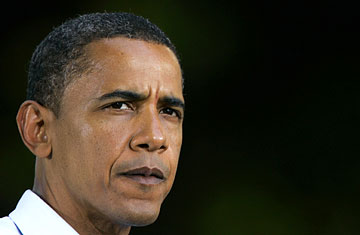
Democratic presidential nominee Barack Obama speaks during a Sept. 4 rally in Lancaster, Pa.
John McCain and Barack Obama are both selling theories about what kind of leader America needs in the 21st century. But the financial crisis yanked their notions out of the lab and tested them in real time, under a magnifying glass. And now we have a much clearer idea of what we would risk with either man.
As often happens in moments of crisis, the candidates were themselves, only more so. McCain was the action hero, who promised to do the brave, hard things that no one else could. Fire the SEC Chairman! Suspend the campaign! Let's Make a Deal! He was a human diorama of the Great Man theory of history. Of course, getting credit for bringing all parties to the table to reach a historic agreement that pretty much everyone hates may make him wonder if action is overrated, especially after his campaign's self-congratulatory statements ended up being premature. Even with stakes higher than they've been for any vote in modern history, McCain still could not deliver his team for a bipartisan deal; even his own state's Representatives said no.
Obama, meanwhile, got to test his Unified Theory of Change We Can Believe In. His reserved, backstage approach risked looking cautious and calculating in its own way. But he has been arguing that the only way anything will change is if voters change the terms of the whole transaction and force government to listen to them and not just the lobbyists whispering in their ears. Just as this campaign has focused attention on electoral politics as never before, so did this crisis draw all eyes to Washington and how it works — and no one much liked what they saw. A government that could not lift a finger to fix health care or highways could suddenly find $700 billion for No Banker Left Behind? And so this time, people made themselves heard: they passed petitions, lit up the phone lines, melted the message boards. In an age of poisonous partisanship, it was like an antitoxin, the country drawn together, red and blue, young and old, in disgust at elected Representatives who had failed to foresee or forestall a man-made, slow-motion catastrophe.
As the talks derailed, Obama's more hands-off approach looked like a much smarter bet than McCain's all-in hand. But Obama may also now have some second thoughts about the virtues of national unity and citizen involvement. Sometimes it feels like democracy in action. Other times it feels like mob rule. The complexity of the problem and intricacy of the solution meant that the public response was more emotional than anything else. In a leadership vacuum, we got irrational belligerence, a desire to punish the greedheads that will take its broadest toll on the victims, not the perps. And for all the righteous rage, there was a refusal to admit that in many cases Wall Street's sins are also our own: the average American has nine credit cards with a $12,000 balance; we don't save; we overreach; and together we've created a situation where the prudent who lived within their means are expected to pay for the recklessness of both their neighbors and their leaders.
In one sense, it was a good time for both men to be auditioning for Leader of the Free World, since the ones already onstage were falling flat on their faces. It made for a sickening spectacle, watching the firefighters argue over the diameter of the hose as the house burned down around us. And President Bush, in a final countdown to oblivion and with sub-basement approval ratings, was hardly in a position to rally the public behind a plan that violated every economic and political principle he's ever espoused.
Fixing this crisis will involve compromises no one likes and discipline everyone needs. That's a pretty good template for the challenges ahead, like energy independence and entitlement reform. As a Senator, McCain has a long record of taking hard positions and ignoring party orthodoxy in the hunt for common ground. Obama, meanwhile, has claimed that he can expand the concept of citizenship to include more than casting a ballot every so often. But neither one dug in this time to explain why this bailout was necessary and why people needed to swallow hard and accept it, most notably when they were given the opportunity during last Friday's debate. It's natural that they didn't want to be too closely tied to a bill whose importance is matched only by its unpopularity. But it's not like the job they're auditioning for is getting any easier.
